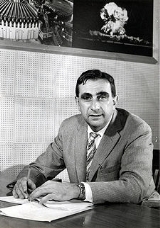
theoretical
physicist
, known colloquially as "the father of the hydrogen bomb," even though he did not care for the title. Teller made numerous contributions to nuclear
and molecular physics
, spectroscopy
(the Jahn–Teller and Renner–Teller effects), and surface
physics. His extension of Fermi's theory of beta decay
(in the form of the so-called Gamow–Teller transitions) provided an important stepping stone in the applications of this theory.
There's no system foolproof enough to defeat a sufficiently great fool.![]()
A fact is a simple statement that everyone believes. It is innocent, unless found guilty. A hypothesis is a novel suggestion that no one wants to believe. It is guilty, until found effective.![]()
Two paradoxes are better than one; they may even suggest a solution.![]()
My name is not Dr. Strangelove or: How I Learned to Stop Worrying and Love the Bomb|Strangelove. I don't know about Strangelove. I'm not interested in Strangelove. What else can I say?... Look. Say it three times more, and I throw you out of this office. ![]()
When you fight for a desperate cause and have good reasons to fight, you usually win.![]()

